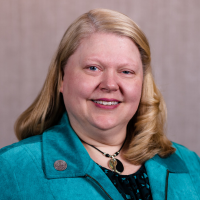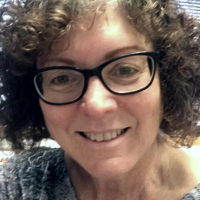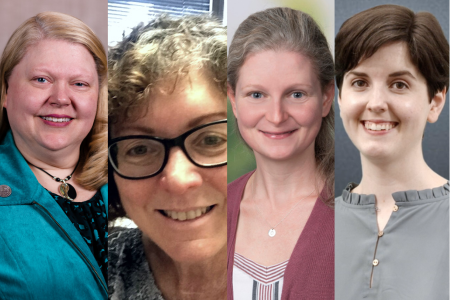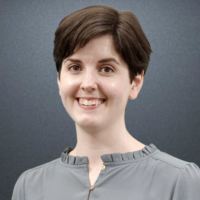Those who work in graduate medical education (GME) play an integral role in helping medical students schedule clinical rotations, and find and gain acceptance to residency and fellowship training programs.
To recognize GME Professionals Day on August 18, the NBOME reached out to a few administrators to share insight into their profession and offer tips for students when selecting a training program:
 Sheri Clarke, PhD
Sheri Clarke, PhD
DIO/Director of Medical Education
Ascension Macomb Oakland Hospital
Lansing, MI
NBOME Board Member
 Susan M. McFadden, MS
Susan M. McFadden, MS
OB/GYN Residency Program Administrator
Cooper University Hospital
Camden NJ

Sarah Giardini, MS
Residency Program Administrator
Bon Secours Richmond Health System
Richmond, VA
Kelsey Schneider
Neurology Fellowship Program Coordinator
VCU Health
Richmond, VA
How do you describe your profession to individuals not in the GME training community?
Susan McFadden: I coordinate the administrative work that helps medical students move on to complete their hands-on training in their chosen specialty so they can become fully prepared physicians.
Sarah Giardini: My role as a program administrator is managing the daily administrative and operational activities of the program. For some students, residency training is their first “real job” outside of school, so being a mentor is part of the job too! We are training the next generation of physicians.
Sheri Clarke: Most people understand the concept of a school board, superintendent, principal, and teachers. I explain that our “school board” is the Graduate Medical Education Committee (GMEC). The GMEC sets quality expectations and reviews all programs for needed improvements. As the designated institutional officer (DIO), I often function as the superintendent–with lots of support from the central GME staff–providing structure, policies, oversight, and resources to meet the expectations of the GMEC.
Kelsey Schneider: My job is to make sure students are getting what they need from their current experience to springboard into their ideal next career step. And to send them reminders about paperwork, of course.
How would you advise students as they embark on selecting a training program?
SM: Other than studying and doing well on COMLEX, be well-rounded. Include your interests outside of medicine in your application. Be open and sincere when writing personal statements. Be patient, and don’t constantly contact the programs.
SG: Residency training can be hard both physically and mentally, so it is important for students to find an environment they can thrive in while maintaining a good work-life balance. Also, research the types of training opportunities the program offers and their board pass score rates. This is public knowledge and could make all the difference! Finally, try to explore the area of the program–this will be your home for the next three years!
SC: Determine what program attributes are most important to you (location, scholarly activity, size, patient scope/volume, simulation, technology, etc.), then make sure to score each program based on your interests and needs. Make sure that you are picking the right specialty for your lifestyle, preferences, and skillset. Stay up to date on the deadlines and expectations that are set and develop good relationships with the faculty, nurses, coordinators, and others in your daily life. And read your emails!
KS: Listen to how the faculty speak to and about each other. While location and training opportunities are of course important when selecting a program, I’ve found that a good workplace culture can make for an exceptional experience. Also, decide what is most important to you: location? Training opportunities? Faculty? Deciding which single factor is most important will tip the balance to make deciding much easier. Finally, if you are really interested in a program, be sure to reach out to faculty after your interview. It can really help you stand out amongst a large pool of applicants.
What characteristics define a successful resident?
SM: I think the most important are: commitment, compassion, humility, courage, enthusiasm, strong work ethic, excellent interpersonal skills, and a sense of humor.
SG: Integrity, receptive to feedback, enthusiasm for learning, and excellent interpersonal skills.
KS: I think the most successful trainees have a collaborative approach to their work. This kind of mindset helps the trainee get the most from their educational experience and helps foster professional relationships that will prove invaluable in their later career.
SC: A successful resident is one that leaves the ego in the car every day. This is a training environment. We do not expect you to be perfect, but we do expect you to try your best and show improvement throughout your program. Take the critical feedback that is provided and actively work on improving. Also: Successful residents present themselves as professionals at all times. The hospital’s primary responsibility is patient safety and quality care and this is done through teamwork and collaboration–there is no place for unprofessional behavior in the clinical environment.
What is the most fulfilling aspect of your job?
SM: Watching the trainees grow and become confident, successful physicians is the most rewarding part of the job.
SG: Getting to meet and interact with all types of people from around the world! Not only have I worked with a diverse group of residents, but faculty as well. During each interaction, you learn from each other and grow as an individual.
KS: I get so much joy from supporting a trainee through their entire fellowship, from interviews through graduation. It’s wonderful to see how they grow within the program and how their contributions help shape the program’s future. I feel fortunate to support them through this process and am always excited to see where they go next.
SC: This profession is about giving back to the next generation. I have had the privilege of participating in the training of thousands of new physicians as they develop life-saving skills. I have benefited from my profession, as I have already relied on these skilled physicians to care for myself and my family.
GME Professionals Day was introduced by the Association for Hospital Medical Education (AHME) and is wholly embraced by graduate medical education training programs throughout the country – including the Accreditation Council for Graduate Medical Education. Every third Friday in August, training programs and institutions recognize the hard work and contributions that all GME administrative professionals provide within their specialty-specific training programs or institutional GME offices. To learn more, visit www.ahme.org.


